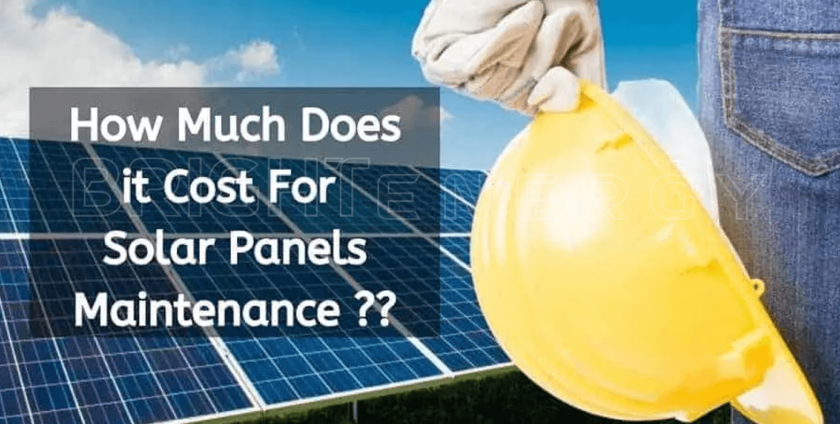
Solar energy has emerged as a popular and sustainable alternative to traditional fossil fuels, offering a cleaner and more environmentally friendly way to generate electricity. As solar power systems become more prevalent, it is essential to understand the maintenance requirements associated with these systems to ensure their optimal performance and longevity. In this comprehensive guide, we will explore the cost and frequency of solar maintenance, providing valuable insights for homeowners and businesses considering or already utilizing solar energy.
Understanding Solar Maintenance
Solar maintenance refers to the regular inspection, cleaning, and repair of solar panels and their associated components to ensure they operate efficiently and reliably over their intended lifespan. Proper maintenance is crucial to maximize the energy output of solar systems, enhance their return on investment, and avoid potential issues that may arise due to neglect or environmental factors.
The Components of Solar Maintenance
Solar maintenance involves several key components:
Solar Panel Cleaning
Solar panels are exposed to various environmental elements. This usually includes dust, dirt, bird droppings, and pollen, which can accumulate on the surface over time. These deposits can reduce the amount of sunlight reaching the solar cells, leading to a decrease in energy production. Regular cleaning helps ensure that solar panels operate at their maximum efficiency.
Electrical System Inspection
The electrical components of a solar system, including inverters, wiring, and connections, should be regularly inspected for signs of wear, damage, or malfunctions. Faulty electrical components can hinder the proper functioning of the Solar System and may require repairs or replacements.
Performance Monitoring
Many modern solar systems come equipped with monitoring systems that allow homeowners or system operators to track the energy production and performance of the solar panels. Regular monitoring helps identify any deviations from expected energy output, enabling prompt detection and resolution of issues.
Structural Inspection
The structural integrity of the solar panel mounting system should be checked periodically to ensure that it can withstand environmental factors such as wind, snow, and other extreme weather conditions.
Battery Maintenance (If Applicable)
If the solar system includes energy storage batteries, additional maintenance tasks may be required to ensure the optimal performance and lifespan of the batteries.
The Frequency of Solar Maintenance
The frequency of solar maintenance depends on various factors, including the location of the solar system, environmental conditions, system design, and the specific components used. In general, the following maintenance schedule is recommended:
Solar Panel Cleaning
Solar panels should be cleaned at least twice a year to remove dirt and debris. However, the cleaning frequency may vary based on location and environmental factors. Areas with high pollution, dust, or bird activity may require more frequent cleaning.
Electrical System Inspection
The electrical system of the solar installation should be inspected annually to ensure that all components are functioning correctly. Additionally, electrical connections should be checked during routine maintenance visits.
Performance Monitoring
Performance monitoring should be conducted regularly, such as on a monthly or quarterly basis, to track energy production trends and identify any deviations from expected output.
Structural Inspection
The structural integrity of the solar panel mounting system should be inspected annually, especially after severe weather events or extreme weather conditions.
Battery Maintenance (If Applicable)
If the solar system includes batteries for energy storage, battery maintenance should be conducted based on the manufacturer’s recommendations. This may involve regular inspections, testing, and battery replacements as needed.
The Cost of Solar Maintenance
The cost of solar maintenance can vary depending on the size of the solar system, the complexity of the installation, and the specific maintenance tasks required. Here are some factors that can influence the cost of solar maintenance:
System Size
Larger solar systems with more panels and components may require more time and effort to maintain, leading to higher maintenance costs.
Accessibility
The ease of access to solar panels and other system components can affect the cost of maintenance. Systems that are more difficult to reach may require specialized equipment or additional labor, increasing the overall cost.
Location
The location of the solar system can impact maintenance costs. Systems in areas with high levels of pollution, dust, or harsh environmental conditions may require more frequent and thorough cleaning and inspections.
Service Provider
The cost of solar maintenance can also vary based on the service provider’s pricing and the level of service offered. It is essential to obtain quotes from multiple service providers and compare the scope of services included.
DIY vs. Professional Solar Maintenance
Some homeowners may consider performing solar maintenance themselves to save on costs. While basic maintenance tasks like cleaning the solar panels can be done by homeowners, certain maintenance tasks, such as electrical system inspections or battery maintenance, are best left to trained professionals.
Professional solar maintenance offers several advantages:
Expertise
Trained professionals have the knowledge and experience to identify potential issues and perform maintenance tasks effectively.
Safety
Solar systems involve electrical components, and working with electricity can be dangerous for individuals without the necessary expertise and safety training.
Warranty Compliance
Many solar panel manufacturers require professional maintenance to maintain the warranty validity.
Longevity
Proper maintenance by professionals can extend the lifespan of the solar system and optimize its performance.
Conclusion
Solar maintenance is a critical aspect of ensuring the long-term performance and efficiency of solar power systems. By following a regular maintenance schedule and enlisting the services of trained professionals, homeowners, and businesses can protect their solar investments and continue to enjoy the benefits of clean and renewable energy. While the cost of solar maintenance can vary based on factors such as system size and location, it is a worthwhile investment to maximize the energy output and lifespan of the solar system. Regular cleaning, electrical system inspection, performance monitoring, and structural checks will help ensure that your solar panels operate optimally and contribute to a greener and more sustainable future.
Related Cool Links:
- By: Admin
- Tags: The Cost And Frequency of Solar Maintenance
- 0 comment

Leave a Reply